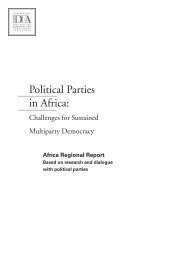Background Document - Danish Institute for Parties and Democracy
Background Document - Danish Institute for Parties and Democracy
Background Document - Danish Institute for Parties and Democracy
Create successful ePaper yourself
Turn your PDF publications into a flip-book with our unique Google optimized e-Paper software.
<strong>and</strong> set new st<strong>and</strong>ards of female citizenship with the dem<strong>and</strong> that women have the<br />
right to rule their own bodies. Affirmative action became statutory <strong>and</strong> was, on the<br />
advice of the United Nations’ fourth World Conference on Women in 1995, supplemented<br />
by a third equal status strategy, gender mainstreaming.<br />
WOMEN AND DEMOCRACY<br />
So what has a hundred years of women in politics meant to <strong>Danish</strong> society? First <strong>and</strong><br />
<strong>for</strong>emost, it has meant democratisation. Long gone are the days when regimes that<br />
reserved political rights <strong>for</strong> (select groups of) men could be labelled democratic. Today,<br />
democracy legitimises itself through universal human rights <strong>and</strong> equal political<br />
representation. In other words, by recognising the legitimacy of feminism’s first two<br />
arguments <strong>for</strong> women’s political rights.<br />
The resource argument – that women have different areas of compe-tence than<br />
men, <strong>and</strong> that this has contributed to an improved process of political decision-making<br />
– is more questionable.<br />
On the one h<strong>and</strong>, a clear, gender-based division of labour can be demonstrated,<br />
under which women have h<strong>and</strong>led the ‘softer’ policy areas, such as equal status policy,<br />
social policy, <strong>and</strong> cultural policy. On the other h<strong>and</strong>, women have stuck to party lines<br />
in these as in all other policy issues. There are very few examples of women collaborating<br />
across party divides, <strong>and</strong> in the end, it is the male majority that has established<br />
the “woman-friendly” welfare state through their votes in Parliament. More research<br />
is thus needed to properly investigate this important question<br />
The question remains whether the <strong>Danish</strong> model may serve as inspiration <strong>for</strong><br />
countries undergoing democratic transition today, when alternative, <strong>and</strong> faster, roads<br />
to political equality are available. Quota systems, in particular, have proven to be very<br />
effective instruments.<br />
But maybe the secret to sustainable equal status development is that it is rooted<br />
in a combination of top-down <strong>and</strong> bottom-up politics. The state may institute equality<br />
be<strong>for</strong>e the law, but carrying this over into equality in life required the cooperation<br />
of civil society. And here, others can perhaps draw on the experiences of the <strong>Danish</strong><br />
women’s movement when it comes to in<strong>for</strong>mation campaigns, women’s mobilisation<br />
<strong>and</strong> organisation within political parties, <strong>and</strong> electoral campaigns.<br />
BIBLIOGRAPHY<br />
American Declaration of Independence. United States National Archives; http://www.archives.gov/<br />
exhibits/charters/declaration_transcript.html<br />
Dansk kvindehistorie www.kvinfo.dk<br />
History.com; http://www.history.com/this-day-in-history/abigail-adams-urges-husb<strong>and</strong>-to-remember-the-ladies<br />
Kvinder i Folketinget; http://www.ft.dk/Demokrati/~/media/Pdf_materiale/Pdf_publikationer/In<strong>for</strong>mationsark/Folketingets_medlemmer/kvinder_i_folketinget%20pdf.ashx<br />
Dahlerup, Drude, Vi har ventet længe nok: håndbog i kvinderepræsentation, Kbh.: Nordisk Ministerråd,<br />
1988<br />
Equal democracies?: gender <strong>and</strong> politics in the Nordic countries, Christina Bergqvist (editor in chief),<br />
Anette Borchorst ... [et al.], Oslo: Sc<strong>and</strong>inavian University Press, 1999<br />
Duiker, William J., <strong>and</strong> Jackson J. Spielvogel. World History: From 1500. Cengage Learning, 2006.<br />
Larsen, Jytte, Også <strong>and</strong>re hensyn: dansk ligestillingspolitik 1849-1915, Århus: Aarhus Universitets<strong>for</strong>lag,<br />
2010<br />
Mill, John Stuart. The Subjection of Women. Hayes Barton Press, 1924.<br />
Pateman, Carole, “Three Questions about Womanhood Suffrage”, Caroline Daley & Melanie Nol<strong>and</strong><br />
(red.), Suffrage <strong>and</strong> Beyond. International Feminist Perspectives. New York University Press, 1994<br />
WOMEN IN POLITICS DANISH INSTITUTE FOR PARTIES AND DEMOCRACY PAGE 55
















